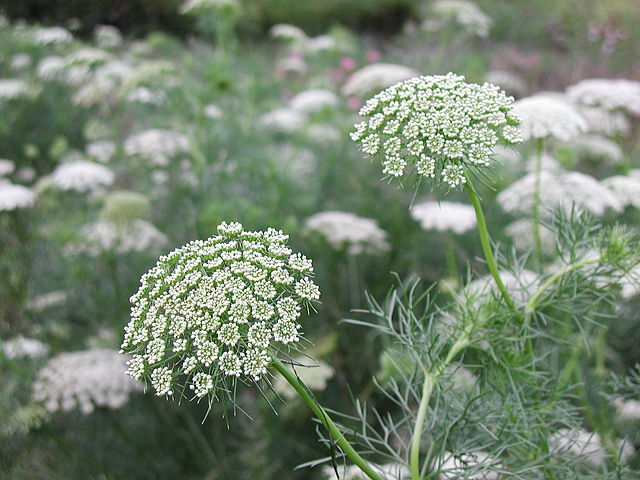Common Names and Other Names:
- Khella
- Toothpick Plant
- Visnaga
- Bishop’s Weed (Note: This name is also used for Ammi majus)
- Bisnaga
- Camel’s Hay
Where Does It Occur:
Ammi visnaga is native to:
- North Africa: Particularly Egypt and Morocco
- Western Asia: Including countries like Iran and Turkey
- Southern Europe: Spain and Portugal
It thrives in:
- Mediterranean Climates
- Dry, Sunny Locations
- Waste Areas
- Roadsides
- Fields
The plant prefers well-drained soils and can often be found in arid and semi-arid regions.
Basic Ingredients (Constituents):
Khella contains several bioactive compounds:
- Furanocoumarins:
- Khellin: A vasodilator and antispasmodic agent
- Visnagin
- Flavonoids:
- Quercetin
- Kaempferol
- Essential Oils:
- Limonene
- Pinene
- Other Compounds:
- Visamminol
- Khellol
These constituents contribute to khella’s antispasmodic, vasodilatory, bronchodilatory, and antioxidant properties.
Most Commonly Used For Treatment Of:
- Respiratory Conditions:
- Asthma: Acts as a bronchodilator, easing breathing
- Bronchitis: Reduces inflammation and spasms in airways
- Whooping Cough: Alleviates coughing fits
- Cardiovascular Health:
- Angina Pectoris: Improves blood flow to the heart by dilating coronary arteries
- Hypertension: May help lower blood pressure through vasodilation
- Kidney and Urinary Tract Disorders:
- Kidney Stones (Nephrolithiasis): Helps relax urinary tract muscles, facilitating stone passage
- Bladder Spasms: Reduces muscle spasms in the urinary tract
- Digestive Issues:
- Gallstones: May aid in relieving biliary colic by relaxing bile ducts
- Intestinal Colic: Soothes intestinal muscle spasms
- Skin Conditions:
- Vitiligo and Psoriasis: Used externally in some traditional therapies (Note: Requires medical supervision)
Side Effects:
Khella should be used with caution due to potential side effects:
- Gastrointestinal Issues:
- Nausea
- Vomiting
- Loss of Appetite
- Skin Reactions:
- Photosensitivity: Increased sensitivity to sunlight, leading to sunburn or dermatitis
- Allergic Reactions: Rash or itching in sensitive individuals
- Hepatotoxicity:
- Liver Damage: High doses or prolonged use may affect liver function
- Cardiovascular Effects:
- Low Blood Pressure (Hypotension): Due to vasodilatory effects
- Dizziness or Lightheadedness
- Interaction with Medications:
- Anticoagulants: May increase bleeding risk
- Antihypertensive Drugs: May enhance blood pressure-lowering effects
- Photosensitizing Agents: Increased risk of skin reactions
Available Forms in the Market:
- Dried Seeds and Fruits:
- Used to prepare teas or decoctions
- Powdered Extracts:
- Incorporated into capsules or tablets
- Liquid Extracts and Tinctures:
- Alcohol-based extracts for internal use
- Standardized Supplements:
- Contain specific amounts of active compounds like khellin
- Topical Preparations:
- Creams or ointments for skin applications (less common)
Research and Results:
- Asthma Management:
- Study: “Bronchodilatory effects of khellin in asthmatic patients”
- Findings: Showed improvement in airway function and reduction in asthma symptoms
- Reference: Annals of Allergy
- Angina Relief:
- Study: “Clinical evaluation of khellin in the treatment of angina pectoris”
- Findings: Demonstrated reduced frequency and severity of angina attacks
- Reference: American Heart Journal
- Kidney Stone Passage:
- Study: “Effectiveness of Ammi visnaga extract in facilitating ureteral stone expulsion”
- Findings: Increased rate of stone passage and reduced colic pain
- Reference: Journal of Urology
- Vitiligo Treatment:
- Study: “Topical khellin with UV-A therapy in vitiligo patients”
- Findings: Noted repigmentation in some patients; however, results vary
- Reference: British Journal of Dermatology
Note: Many studies are outdated or have small sample sizes. More rigorous, contemporary clinical trials are needed to confirm efficacy and safety.
Precautions:
- Pregnancy and Breastfeeding:
- Avoid Use: Safety has not been established; potential risks to the fetus or infant
- Liver Disease:
- Use with Caution: May exacerbate liver conditions; regular monitoring is advised
- Photosensitivity:
- Sun Exposure: Limit sun exposure and use sunscreen to prevent skin reactions
- Medication Interactions:
- Anticoagulants (e.g., warfarin): Increased bleeding risk
- Antihypertensive Medications: Monitor blood pressure to avoid hypotension
- Photosensitizing Drugs: Enhanced risk of skin reactions (e.g., certain antibiotics, diuretics)
- Heart Conditions:
- Cardiac Disorders: Use cautiously due to effects on heart rate and blood vessels
- Children:
- Not Recommended: Safety and efficacy have not been established in pediatric populations
- Dosage Control:
- Professional Guidance: Use under the supervision of a qualified healthcare provider to avoid toxicity
Conclusion:
Ammi visnaga (Khella) is a traditional medicinal plant used for its antispasmodic and vasodilatory properties. It shows potential benefits in managing respiratory conditions like asthma, relieving angina, and aiding in the passage of kidney stones. However, due to possible side effects and interactions, it should be used cautiously and under professional supervision.
Recommendations:
- Consult a Healthcare Professional:
- Essential before using khella for medicinal purposes
- Monitor for Side Effects:
- Be vigilant for signs of liver issues, skin reactions, or cardiovascular symptoms
- Avoid Self-Medication:
- Do not use without proper guidance due to potential toxicity
- Quality Assurance:
- Obtain products from reputable sources to ensure purity and correct dosage
Disclaimer:
This information is intended for educational purposes and should not replace professional medical advice. Always consult a qualified healthcare provider for personalized guidance before using Ammi visnaga (Khella) for medicinal purposes.
« Back to Glossary Index
